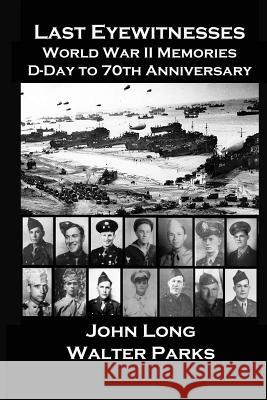Last Eyewitnesses, World War II Memories: D-Day to 70th Anniversary » książka
Last Eyewitnesses, World War II Memories: D-Day to 70th Anniversary
ISBN-13: 9781499102260 / Angielski / Miękka / 2014 / 258 str.
This book was written to help celebrate the 70th anniversary of D-Day and to preserve the last personal voices of the truly great soldiers that went ashore at Normandy on June 6, 1944 or shortly thereafter. Soon, all these brave men will pass to another time and place. We believe that these men should never be forgotten. Their personal memories must be preserved. Paratroopers, glider pilots, artillery men, medics, dog soldiers, and even a sailor who witnessed Rangers storming the cliffs at Pointe du Hoc were personally interviewed. The interviewees ranged in age from 88 to 93 and to a man, each had some profound stories to tell. Those landing on the beaches have burning memories of the great armada of ships and vessels in the avenging invasion of Normandy. They remember the carnage of bodies on the beaches. I asked one of the Interviewees, George Pulakos to describe his experiences on the beach. GEORGE PULAKOS: They kept me on the beach, I could swim. I was a swimmer and I would recover bodies. We were stacking them like cord wood on the beach. For years I've carried horrific images in my head of all the bodies on the beach. They were stacked like cord wood, 4 and 5 feet high. This book describes such memories from 14 of these warriors. This may be the last documented eyewitness's memories of the D -Day invasion. Four have already died since our interviews of just a few months ago. We interviewed Eugene Meier October 30, 2013; he died 17 days later on November 16, 2013 at age 90. We interviewed Percy Scarborough November 22, 2013; he died 25 days later on December 17, 2013 at age 88. We interviewed Jack Carver December 1, 2013; he died 38 days later on January 8, 2014 at age 90. We interviewed Harold Powers December 9, 2013; he died 23 days later on January 1, 2014 at age 92. This book is indeed about the last eyewitnesses' memories. We begin this heroic, terrible, terrible war story in 1939. That was when the European war really started. That is when Germany invaded Poland, and Britain and France declared war on Germany. Many books have been written about World War II, but most have concentrated on well known leaders and celebrated heroes. We wanted to tell the story through the eyes and memories of the common soldier. Most of our heroic interviewees still had clear memories of the significant events they encountered. We present their memories in their own words because we want you to be able to sense their emotions. The interviews are split into sections so that we can integrate their memories with the chronological and historical framework of their experiences. Some of the interviews were so very visual that we could see the bodies floating in the waters at the beaches. We could see our soldiers falling in the hedgerows and roads of the country side. We could see our soldiers when they were captured and marched long distances in severe weather. We could almost hear the gunfire and smell the gunpowder. We could see the horrors of the German concentration camps. Let's never forget these memories.
Zawartość książki może nie spełniać oczekiwań – reklamacje nie obejmują treści, która mogła nie być redakcyjnie ani merytorycznie opracowana.











